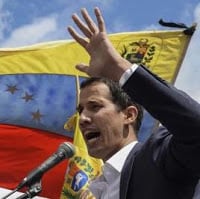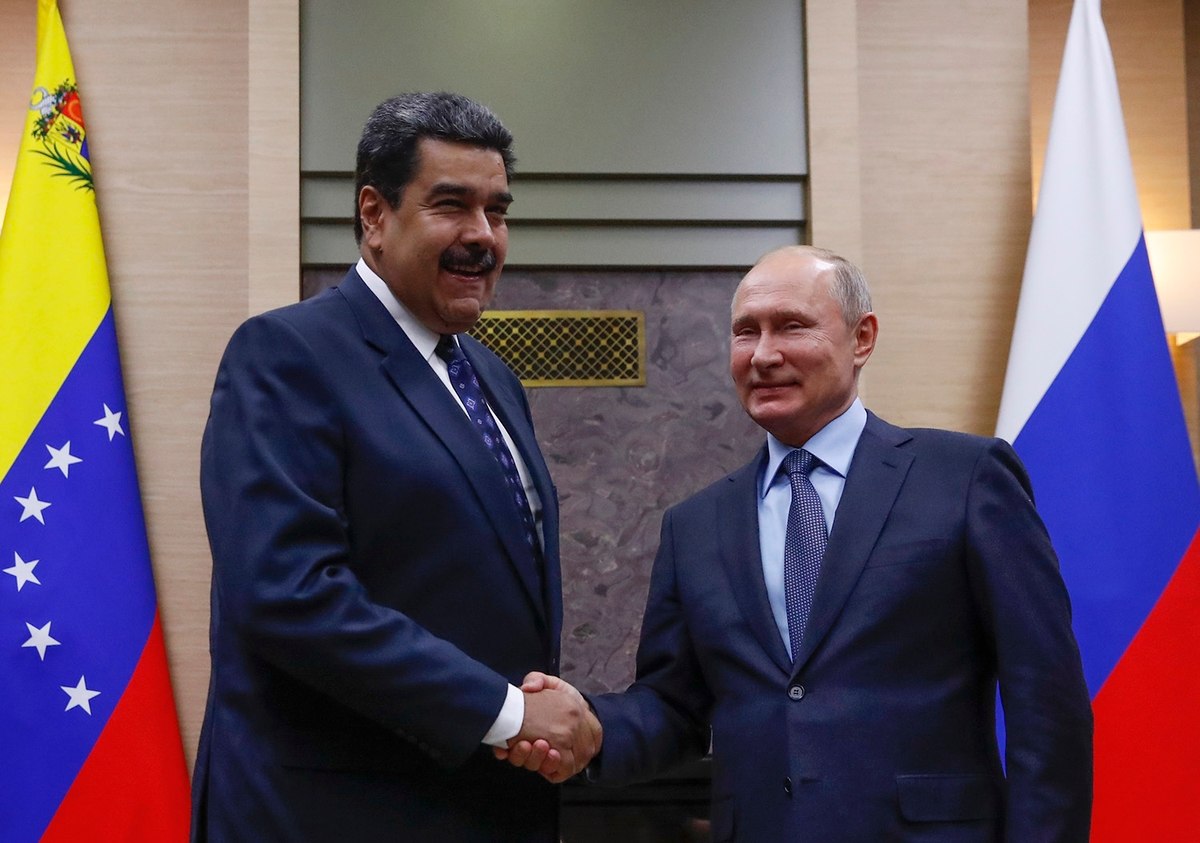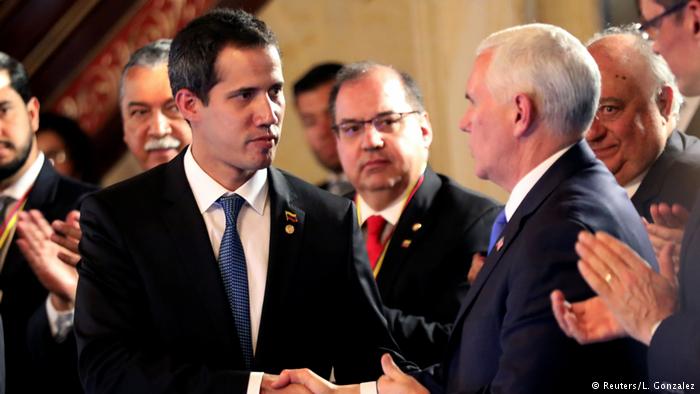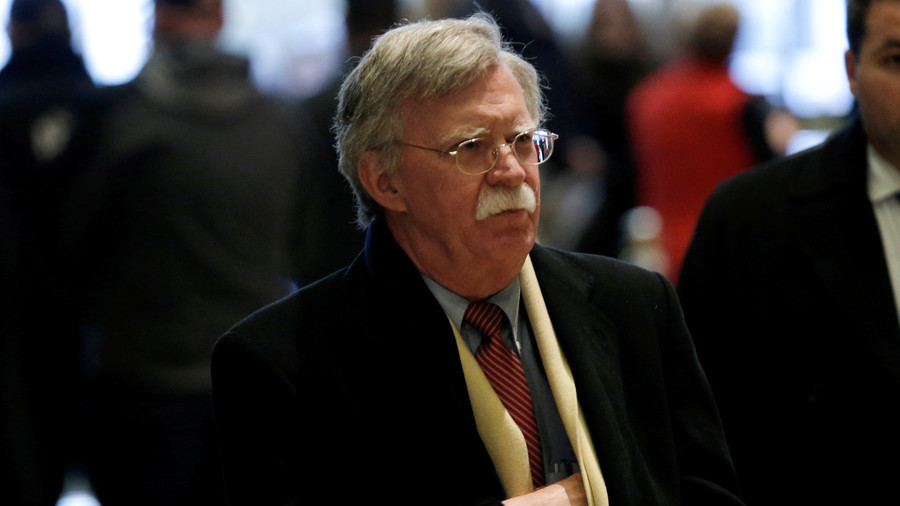|
On May 1 the Washington Post published an article entitled “Venezuela’s opposition put together a serious plan. For now it appears to have failed.”[1] By doing so it has presented its readers with a gripping fairy tale.
The fairy tale
The “hero” is self-proclaimed president Juan Guaido, who assumes the guise of a mild mannered United States agent. He battles to “restore” democracy from the clutches of demonized elected President Nicolas Maduro. True to his heroic character, Juan fights a battle for the “American Way” by peacefully seeking an assumption of power. His well thought out plan is contingent on persuading the ruling President Maduro to fly to Cuba. Along the way, Guaido convinces some top military and civilian aids to join him.
 His plan is validated with a blessing from his benevolent benefactor, the Trump administration. Out of concern for Venezuela’s well-being, US President Trump and his advisors are monitoring Guiado’s efforts closely. Unfortunately, they can’t yet reach an agreement about how to best help Juan. While committed to the cause, Trump is a bit reluctant to use his military forces directly. Nevertheless, some men on his staff are unabashed about saying that use of the military remains an option. The keenest one to rattle his saber is impetuous John Bolton, whose eagerness for war is apparently making Donald nervous. As a compromise, for the time being, the US therefore opts to impose sanctions and helps “run back-end logistics for aid deliveries to Colombia for the Venezuelan people, and a U.S. navy hospital ship sailed to neighbouring Colombia to aid Venezuelan refugees.” His plan is validated with a blessing from his benevolent benefactor, the Trump administration. Out of concern for Venezuela’s well-being, US President Trump and his advisors are monitoring Guiado’s efforts closely. Unfortunately, they can’t yet reach an agreement about how to best help Juan. While committed to the cause, Trump is a bit reluctant to use his military forces directly. Nevertheless, some men on his staff are unabashed about saying that use of the military remains an option. The keenest one to rattle his saber is impetuous John Bolton, whose eagerness for war is apparently making Donald nervous. As a compromise, for the time being, the US therefore opts to impose sanctions and helps “run back-end logistics for aid deliveries to Colombia for the Venezuelan people, and a U.S. navy hospital ship sailed to neighbouring Colombia to aid Venezuelan refugees.”
Throughout the story, Guaido’s claim to the presidency is never disputed. How could it be? He is the heroic champion for democracy. As proof, the story points out that he has the backing of the National Assembly and over 50 nations. What more proof is needed?
 As the tale progresses, the reader is led to believe that had his plan succeeded the story would have had a happy ending. Big bad Maduro would have been allowed to leave in peace. Our hero Juan would have assumed power through a successful coup and thereby restored democracy. Venezuela would have once again have the United States as its friend, and everyone would have lived happily ever after. As the tale progresses, the reader is led to believe that had his plan succeeded the story would have had a happy ending. Big bad Maduro would have been allowed to leave in peace. Our hero Juan would have assumed power through a successful coup and thereby restored democracy. Venezuela would have once again have the United States as its friend, and everyone would have lived happily ever after.
Maduro and Putin
Alas, this happy ending was not to be. Juan’s enthusiasm got the better of him. He prematurely attempted his coup for democracy, named “Operation Liberty”, resulted in failure. Instead of supporting heroic Juan, the Venezuelan military rallied behind their constitutionally elected president. The dream of an American Venezuela was not to be.
Sadly, the story ends with the allegation that Maduro would have abandoned ship had he not been talked out of it. Who could be blamed for undermining such an otherwise flawless plan? The Russians, of course. Hasn’t this been the mantra that has been repeatedly chanted by the mainstream media? Nefarious Russia, despite its abandonment of communism, has been looking for every means possible to undermine Western values – meddling in elections[2], hacking into computers[3].
Lessons
This fairy tale teaches some important lessons:
1. In order to restore democracy, a coup is needed to overthrow the existing democracy.
2. A hero is someone who seeks the help of outside forces, with the expectation that they use military force against his country, if needed, to assure his ascent to power.
3. When providing humanitarian assistance, it is necessary to first impose crippling economic sanctions to necessitate the need for aid.
4. Recognition of a self-proclaimed president by over fifty outside nations is more important than the plebiscite of the constituent citizens of his country, as well as the majority of United Nations members who have either rejected his claim or remained neutral on endorsing him.
5. If all else fails, blame the Russians.
Viewing Venezuela without the fairy tale lens
Unfortunately, like all fairy tales, this article is based on typecast characters who bear little resemblance to the real world. What would have given this account credibility as fact rather than fiction would have been the inclusion of the glaring omissions that would have given it a balanced perspective.
Several facts that have been reported in mainstream or alternate news sources, were apparently deemed neither relevant nor newsworthy for this article. As was repeatedly aired on TV news networks, Juan Guaido swore himself in as president.[4] Is this the type of democratic process that is worthy of endorsement?
 There is no evidence that Maduro ever considered abandoning his post or engaged in secret negotiations with Guiado. Maduro denied this. Nevertheless, the article accepts the allegations by Guaido as facts. Moreover, the possibility that his efforts to remain in power could be interpreted as patriotism is never considered. Instead, he is presented as someone whose decisions are made in consultation with Russian advisers, which has been denied. This is in stark contrast with Guiado who has had photo ops with US Vice President Mike Pence[5], (image right, Guaido meets Pence, February 2019) and is quite open about plotting the overthrow of his government through consultation with the US. There is no evidence that Maduro ever considered abandoning his post or engaged in secret negotiations with Guiado. Maduro denied this. Nevertheless, the article accepts the allegations by Guaido as facts. Moreover, the possibility that his efforts to remain in power could be interpreted as patriotism is never considered. Instead, he is presented as someone whose decisions are made in consultation with Russian advisers, which has been denied. This is in stark contrast with Guiado who has had photo ops with US Vice President Mike Pence[5], (image right, Guaido meets Pence, February 2019) and is quite open about plotting the overthrow of his government through consultation with the US.
Given Venezuela’s economic hardships, and vocal opposition, why does Maduro still have a loyal military, as well as large public demonstrations by supporters? To answer these questions would require another article detailing the numerous programs that he and his predecessor, Hugo Chavez, implemented to prioritize the needs of the poor.[6]
To its credit, the Washington Post includes in this article an online video showing demonstrations by both supporters of Maduro and opposition supporters of Guaido. At first glance, one would consider this to be evidence of balanced reporting, but a closer look tells a different story. More video time is allotted to the opposition, giving one man the opportunity to voice a litany of grievances against Maduro focused on Venezuela’s economic hardships. These grievances are neither questioned nor contested, and no mention is made of the role that US sanctions[7] have played in promoting these hardships.
In most Western democracies, if anyone were to plot a coup, as Guaido openly professes, he would probably be deemed guilty of treason and terrorism. This blatant indictment is never pointed out. Nor has it been asked why has Guaido not yet been arrested and is allowed to roam the streets and speak freely, especially if Maduro is a dictator?
 The aims of the US are presented as humanitarian. If that were so, then why wasn’t its “humanitarian aid” convoy endorsed by the Red Cross[8]? Conveniently, John Bolton’s statement about how beneficial it would be for the US to have US companies controlling Venezuelan oil is omitted.[9] The aims of the US are presented as humanitarian. If that were so, then why wasn’t its “humanitarian aid” convoy endorsed by the Red Cross[8]? Conveniently, John Bolton’s statement about how beneficial it would be for the US to have US companies controlling Venezuelan oil is omitted.[9]
Fact or fiction, as events unfold in Venezuela, we are seeing the struggle of a sovereign nation fighting to resolve its internal disputes. If international law prevails, it would be allowed to do so without outside interference.[10] If that happens, then it might not have the happy ending that mainstream media are rooting for. Nevertheless, it would be a resolution that would have been decided by the Venezuelan people.
*
Note to readers: please click the share buttons below. Forward this article to your email lists. Crosspost on your blog site, internet forums. etc.
The author, Gerrard Bonello, is a retired Vice Principal who currently resides in Mississauga, Ontario. Prior to his career as a school administrator, he was a school teacher of art in high school, and special education in elementary school. During his teaching career he was active in the OECTA teachers unions in the secondary panel executive and on various committees. In the late 1980’s he was a founding member of the Toronto “Teachers Against Apartheid”.
Notes
[1] De Young, Karen, Dawsey, Joshua, and Sonne, Paul .”Venezuela’s opposition put together a serious plan. For now it appears to have failed.” Washingtonpost.com The Washing Post (WP Company LLC) (US), 1 May, 2019.Web.
[2] Lutz, Eric. “Is Russia already messing with the 2020 election?”vanityfair.com Conde Nast, 20 Feb, 2019. Web.
[3] Corera, Gordon. “Russia GRU Claims: UK points finger at Kremlin’s military intelligence”. bbc.com BBC News Service, 4 Oct, 2018. Web.
[4] Connolly, Amanda. “Canada will recognize Juan Guaido as Venezuela’s follows move by U.S. to do the same”. globalnews.ca Corus Entertainment Inc., 23 Jan, 2019. Web.
[5] Widakuswara, Patsy. “Pence: US with Guaido ‘100 Percent’”. voanews.com Voice of America. 25 Feb, 2019. Web.
[6] Ellner, Steve. “Social Programs in Venezuela Under the Chavista Governments”. venezuelanalysis.com. Web.
[7] Selby-Green, Michael. “Venezuela Crisis: Former UN rapporteur says US sanctions are killing citizens”independent.co.uk 26 Jan, 2019. Web.
[8] Koerner, Lucas. “Red Cross, UN Slam ‘Politicized; USAID Humanitarian Assistance to Venezuela”. venezuelanalysis.com. Web.
[9] “Good for business’: Trump adviser Bolton admits US interest in Venezuela’s ‘oil capabilities”. rtcom.RT News App. 28, Jan, 2019. Web.
[10] Black, Christopher. “The Lima Group: International Outlaws”. Journal-neo.org. 4 Feb, 2019. Web.
Featured image is from Sky News
|